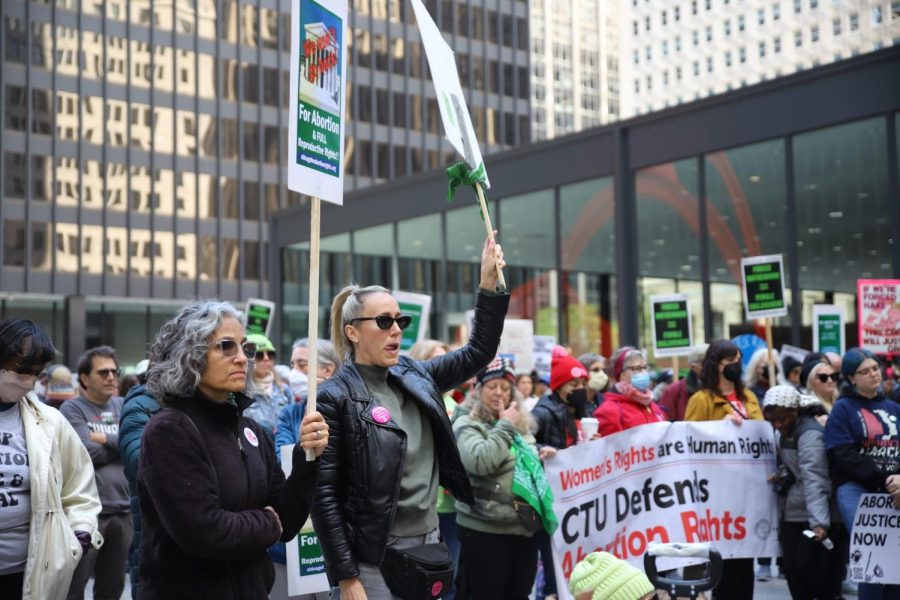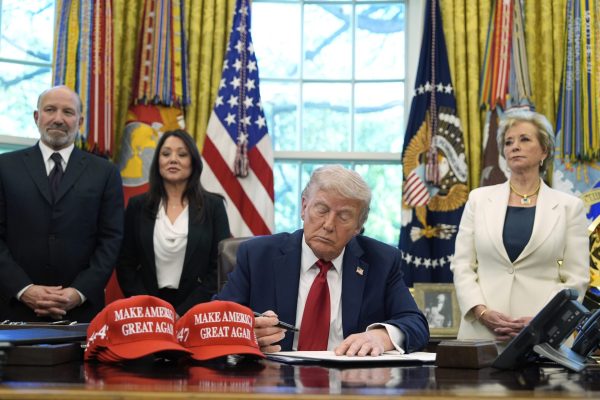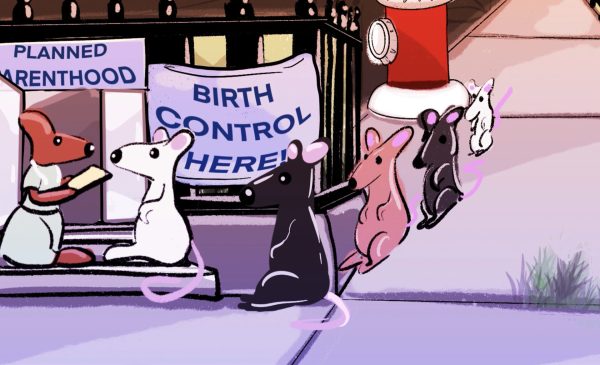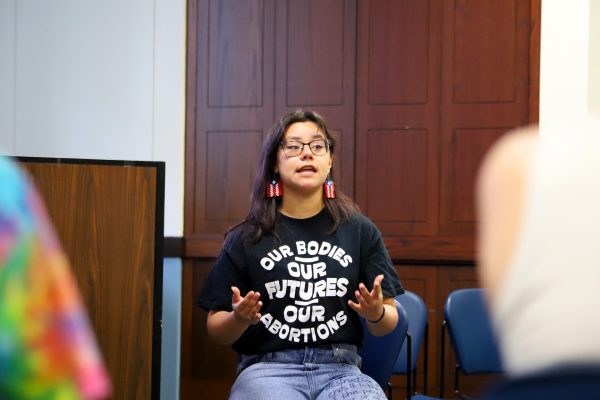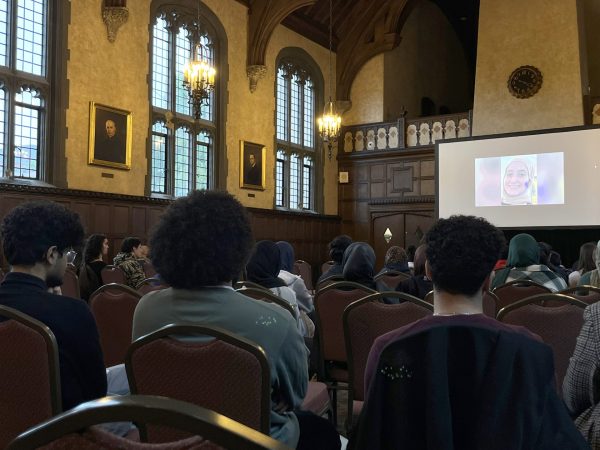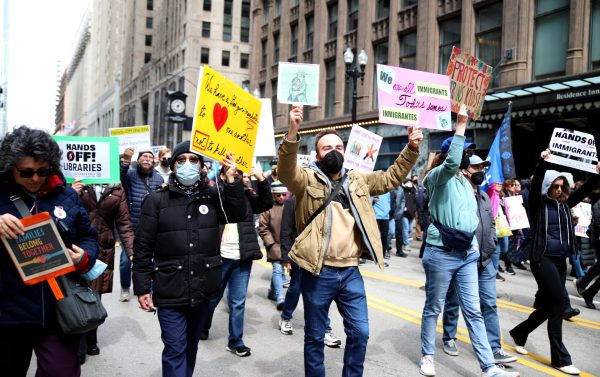Illinois Workers’ Rights Amendment protects right to collectively bargain and unionize
Nadia Carolina Hernandez for The DePaulia
Chicago Teachers Union protested at an abortion rights rally Oct. 8. The CTU actively supports the Workers Rights Amendment.
Being raised by a single mother who worked in a non-union factory her entire life, Joe Bowen, who does campaigning for the Vote Yes for Workers’ Rights group, decided to research unions, soon realizing the important impact they can have on improving working conditions.
“When I was kid, I remember her telling me she didn’t like unions because they were bad for the company,” Bowen said. “Then I learned what they were and what they did, and I realized they would be good for her.”
Now, Bowen is pushing for the passage of the Workers’ Rights Amendment which will appear at the top of the Illinois ballot during the midterm elections.
The amendment was supported by both houses of the Illinois General Assembly in May 2021. In order for it to be officially signed into the Illinois Bill of Rights, 60% of the Illinois electorate must vote in favor during the election on Nov. 8.
Workers’ rights under current legislation are protected by the National Labor Relations Act and the Illinois Public Labor Relations Act. However, with a change of governor or state legislature, these rights could be revoked.
The amendment would add a “Workers’ Rights” section to the Illinois Bill of Rights that protects workers’ rights to organize and collectively bargain to negotiate for higher wages, better hours, working conditions and to promote their economic welfare and safety at work.
“People don’t have fundamentally unreasonable demands,” Bowen said. “They just want to be paid well, they want to know when they have to work, the time they’re going to have for themselves and their family, and they want to know that they’re in a safe workplace.”
While in control of the legislative and executive branches, Illinois Democrats are preparing for the possibility of shifting politics.
“It [the workers’ rights amendment] would preserve that status in the Constitution, which would obviously prevent the legislature from ever passing a right-to-work law in Illinois,” attorney and law professor Gerald A. Golden said. “Given shifting political winds, the possibility that the legislature could be more inclined to support a right-to-work law for a lot of reasons. You know, this would prevent the legislature from having the ability to do so.”
Right-to-work laws, common in Republican controlled legislatures, are pieces of labor legislation that limit union power.
“[Right-to-work laws] prevent an employer and the union from entering into a labor contract that requires that all employees covered by a union contract must join the union and pay dues in order to keep their job,” Golden said.
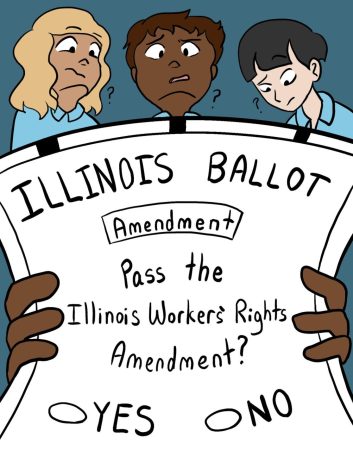
The Illinois Economic Policy Institute, in conjunction with the University of Illinois at Urbana-Champaign (UIUC), found that “By supporting collective bargaining, the Workers’ Rights Amendment would advance the state’s interest in creating high-quality jobs and contribute to a strong economy in Illinois,” via study.
According to a new paper in Cornell University’s ILR Review, researchers examined the benefits of being part of a union for your entire career. The study found, being in a union means a worker could make $1.3 million more over the course of their lifetime. Additionally, being a career-long union member can have the same potential value as a college degree.
Critics argue that the amendment’s language of “economic welfare” is too broad and could be used to strike without prior mediation, which is currently prohibited under Illinois law; however, how this would work in practice is unclear.
“It could be interpreted as an effort to diminish any limitation on certain public employees in Illinois, like teachers, from striking,” Golden said. “Nobody really knows how a judge would apply the law and whether it would be interpreted as a violation of the Illinois constitution.”
A common misconception about collective bargaining is that this measure would allow workers to strike at any time — this is not the case.
“Employees can’t strike while they’re under an existing labor contract, so they can’t just strike at any time unless the contract explicitly gives them the right to, which is an extraordinarily unusual status under a labor contract,” Golden said.
According to Bowen, even if workers had the means or capabilities to go on strike, it is not something that happens often because no one wants to put their financial stability at risk.
“It’s a scare tactic. If you’ve ever talked to a worker who’s gone on strike, that’s not something anyone wants to do,” Bowen said. “What people want is to have good paying jobs and safe working conditions.
Another important aspect of this measure is that it will only affect workers in the public sector. Employees in the private sector are governed by the National Labor Relations Act, a federal law that supersedes any state legislation.
The Chicago Teachers Union (CTU), the state’s largest local of the American Federation of Teachers, employs over 25,000 Chicago teachers and paraprofessionals and is one of the public sector workforces that is frequently mentioned when discussing union power in education.
“The CTU enthusiastically supports the Workers’ Rights Amendment on the November ballot, which guarantees the fundamental rights of workers to organize and have a voice in their workplaces — the very rights that Republicans across the country and right here in Illinois have been trying to undermine for years,” said Christine Geovanis, CTU Communications Director, in a statement to The DePaulia.
Chicago Public School graduates see the importance of teachers’ rights to bargain collectively being enshrined in the Illinois constitution.
“Teachers should have the right to bargain collectively,” said DePaul freshman Lesly Fernandez, a graduate of Senn High School. “They deserve to be able to speak on things that affect them.”
For Bowen, the amendment is not about politics, but is a step toward ensuring the safety and welfare of all workers in Illinois.
“We have gotten further and further from each other, in terms of our ability to recognize what we need as neighbors and to come together over an issue that isn’t political, but is a value,” He said. “This particular amendment gives us the opportunity to bring people together, not around a political party or specific candidate, because this has nothing to do with politics, it’s about voting for yourself.”


